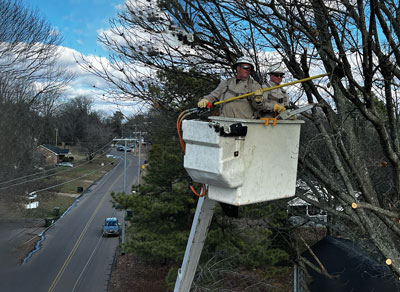Tree-Trimming Program Helps Prevent Outages

Lineworkers David Deloach and Bill Newman have worked every street and road in Ripley Power and Light’s electric system since September, looking for trees and limbs that have grown too close to power lines and equipment.
Their mission is to trim or cut down trees and vegetation that are a threat to power lines—“to cut down the tree before it can tear down the power lines,” David said.
The ultimate goal is to keep customer lights on at all times and maintain the highest level of service reliability possible.
To proactively protect its power lines, Ripley Power and Light has a crew dedicated to trimming and cutting down trees and vegetation year-round.
David has worked for Ripley Power and Light 33 years, and Bill has been with the company 28 years. Together, they do 99% of the cutting and trimming. Four groundsmen— Matthew Bell, Caleb Wright, Ty Buckner and Aston Land— alternate weeks, working in pairs to assist the tree-trimming crew.
“One of the best decisions we made was to put David Deloach in charge of clearing our electric lines of trees that could cause outages,” said President and CEO of Ripley Power and Light Mike Allmand. “As a result, outages due to tree issues have decreased substantially over the past five-plus years. It is an art to taking, in many cases, massive trees down without damaging our electric lines or our customers’ property. David and his team are masters at what they do.”
“The No. 1 cause of outages is weather,” David said. “Trees do not like wind or ice. Strong winds from a pop-up, severe thunderstorm can be a significant issue in the summer, and ice buildup on trees could potentially create outages in the winter. A combination of wind and ice on the trees is a serious threat to the system.”
Ice Storm of ‘94
“For those that remember the Ice Storm of ’94, I am sure you share the same thoughts as we do,” David said. “We never want to experience that again. It was bad for our customers and our linemen.
“At the time, we spent time each winter trimming trees, but we learned in 1994 that we weren’t doing enough. We were concentrating on limbs that were near the high voltage lines and not the limbs above. These high limbs taught us a very valuable lesson.”
Each year, the crew has a route it follows through the entire system from September to the end of March.
“At this time, we are not only tree trimming, but proactively looking for trees that may need to be removed and structural repairs that need to be done to the power lines,” David said.
Talking to Property Owners
“Before cutting down a tree, we talk to the customer who owns the property and get a signed contract that gives us permission to cut the tree down,” David said.
In the summer, David and Bill focus on the company’s rights-of-way lines that may be off the beaten path or hard to reach.
“We also go back to address the trees that were marked during the winter trimming season and work through the contracts to see which trees could be justifiably cut down,” David said.
Customers concerned that tree branches are too close to power lines should contact Ripley Power and Light.
Fewer Outages
“After several years of this aggressive approach, there is no doubt that it has paid off,” David said. “There are significantly fewer outages for our customers due to weather, which means you stay warm, and our men spend more time in the safety of their own homes with their families.”
Some trees can be skipped a year or two because of low growth. Some trees must be trimmed every year.
As they work, David and Bill try to maintain the integrity of the trees and keep customers happy.
Customer Satisfaction
“We try not to go into someone’s yard and just take one side of the tree,” David said. “Most of the time, we’re able to round out the tree.
“When we leave that yard, we want to make sure it’s in good shape. We want the customer to be satisfied. We ask, ‘if that was my tree, how would I want it to look?’”
They also make sure the yard is cleaned of debris caused by the trimming.
After decades of working the system, David said it’s rare that someone can ask about a tree that he doesn’t know about.
“We love trees,” he said. “We just don’t like trees that are going to interfere with power lines.”
